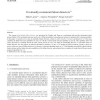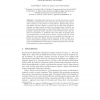21 search results - page 4 / 5 » Consensus with Byzantine Failures and Little System Synchron... |
PODC
1992
ACM
13 years 9 months ago
1992
ACM
We determine what information about failures is necessary and sufficient to solve Consensus in asynchronous distributed systems subject to crash failures. In Chandra and Toueg [199...
PDP
2002
IEEE
13 years 10 months ago
2002
IEEE
The concept of unreliable failure detector was introduced by Chandra and Toueg as a mechanism that provides information about process failures. This mechanism has been used to sol...
EDCC
2005
Springer
13 years 10 months ago
2005
Springer
Unreliable failure detectors are a well known means to enrich asynchronous distributed systems with time-free semantics that allow to solve consensus in the presence of crash failu...
SPAA
2010
ACM
13 years 10 months ago
2010
ACM
In this work, we address Byzantine agreement in a message passing system with homonyms, i.e. a system with a number l of authenticated identities that is independent of the total ...
DC
2007
13 years 5 months ago
2007
Abstract Many reliable distributed systems are consensusbased and typically operate under two modes: a fast normal mode in failure-free synchronous periods, and a slower recovery m...


